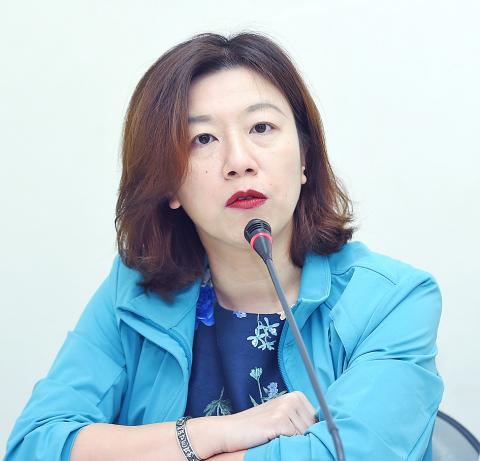Democratic Progressive Party (DPP) Legislator Lin Ching-yi (林靜儀) yesterday resigned as spokeswoman for President Tsai Ing-wen’s (蔡英文) campaign office after equating “advocating unification” with “treason” in an interview.
In the interview, titled “Advocating unification borders on treason,” published by Deutsche Welle yesterday, Lin, speaking in her capacity as campaign office spokeswoman, said that the Tsai administration last year reiterated that pro-Taiwanese independence advocates should stand united, regardless of whether they identify the nation as “Taiwan” or as the “Republic of China.”
Asked whether the DPP “does not care about people who want unification with China,” she raised the question of whether advocating unification with China constitutes treason.

Photo: Liao Chen-huei, Taipei Times
“Constitutionally, and presently, we consider the Chinese Communist Party a menacing party and a menacing regime. They have missiles targeting us and have incessantly threatened to invade us by force,” Lin said.
“To the nation, such a propositions are treasonous. They are unacceptable and will spark discussions on the limits of freedom of speech,” she said.
After Deutsche Welle said that people who advocate unification with China would have difficulty accepting her narrative, Lin said: “That has to do with the nation’s sovereignty.”
“Those people are calling for the nation’s sovereignty to be abandoned so that it can become a part of China,” she said.
Asked if she thought the proposition of unification with China was treason, Lin said: “On many fronts.”
“This is especially true after [last year’s] amendments to five acts on national security that strip retired military officers of their pensions if they travel to China to listen to speeches, take part in political events or attend military parades,” Lin said. “In terms of politics — and especially in terms of national defense — it causes great damage to national sovereignty.”
Lin later apologized on Facebook, saying that her wording in the interview was “not precise enough” and announcing that she had resigned as Tsai’s campaign office spokeswoman.
The nearly half-hour-long interview could be misunderstood or overinterpreted, which has sparked controversy, she said.
Deutsche Welle later ran a correction notice on its Web site, saying that the interview’s original title was misleading and changing it to “Advancing unification borders on ‘treason.’”

Alain Robert, known as the "French Spider-Man," praised Alex Honnold as exceptionally well-prepared after the US climber completed a free solo ascent of Taipei 101 yesterday. Robert said Honnold's ascent of the 508m-tall skyscraper in just more than one-and-a-half hours without using safety ropes or equipment was a remarkable achievement. "This is my life," he said in an interview conducted in French, adding that he liked the feeling of being "on the edge of danger." The 63-year-old Frenchman climbed Taipei 101 using ropes in December 2004, taking about four hours to reach the top. On a one-to-10 scale of difficulty, Robert said Taipei 101

Nipah virus infection is to be officially listed as a category 5 notifiable infectious disease in Taiwan in March, while clinical treatment guidelines are being formulated, the Centers for Disease Control (CDC) said yesterday. With Nipah infections being reported in other countries and considering its relatively high fatality rate, the centers on Jan. 16 announced that it would be listed as a notifiable infectious disease to bolster the nation’s systematic early warning system and increase public awareness, the CDC said. Bangladesh reported four fatal cases last year in separate districts, with three linked to raw date palm sap consumption, CDC Epidemic Intelligence

Taiwanese and US defense groups are collaborating to introduce deployable, semi-autonomous manufacturing systems for drones and components in a boost to the nation’s supply chain resilience. Taiwan’s G-Tech Optroelectronics Corp subsidiary GTOC and the US’ Aerkomm Inc on Friday announced an agreement with fellow US-based Firestorm Lab to adopt the latter’s xCell, a technology featuring 3D printers fitted in 6.1m container units. The systems enable aerial platforms and parts to be produced in high volumes from dispersed nodes capable of rapid redeployment, to minimize the risk of enemy strikes and to meet field requirements, they said. Firestorm chief technology officer Ian Muceus said

MORE FALL: An investigation into one of Xi’s key cronies, part of a broader ‘anti-corruption’ drive, indicates that he might have a deep distrust in the military, an expert said China’s latest military purge underscores systemic risks in its shift from collective leadership to sole rule under Chinese President Xi Jinping (習近平), and could disrupt its chain of command and military capabilities, a national security official said yesterday. If decisionmaking within the Chinese Communist Party has become “irrational” under one-man rule, the Taiwan Strait and the regional situation must be approached with extreme caution, given unforeseen risks, they added. The anonymous official made the remarks as China’s Central Military Commission Vice Chairman Zhang Youxia (張又俠) and Joint Staff Department Chief of Staff Liu Zhenli (劉振立) were reportedly being investigated for suspected “serious